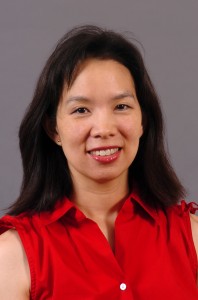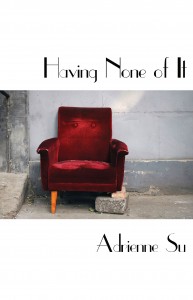
Adrienne Su is the author of three books of poems, Middle Kingdom (Alice James, 1997), Sanctuary (Manic D Press, 2006), and Having None of It (Manic D, 2009). Among her awards are a Puschart Prize and an NEA fellowship. She is poet-in-residence and chair of the English department at Dickinson College in Pennsylvania. Recent poems are forthcoming in The Kenyon Review, The New Republic, New England Review, and Hawai’i Pacific Review.
***
LR: In the 1990s, you participated in the slam poetry revival, even going to the nationals for the NYC team in 1991. How did you move from the poetry slam world to your current place in academia?
AS: I fell into the poetry slam by accident when I was too young to have a writerly identity and the slam was too young to have specific expectations of contestants. There was less of a page-stage divide. I saw no contradiction in reading my poems at the Nuyorican Poets Café while sending them to university-based literary journals. And the Nuyorican was a revelation. I’d never experienced writing in such a social way before. So while it may look as if I made a major transition over the years, I was really pursuing what I loved all along in whatever venues would have me. The people I met in both worlds had the same passions, though they may have been expressed differently on the surface.
Getting into academia was a different story: you don’t get an academic job by accident. Even there, though, I thought my presence might be temporary. I started out as a sabbatical replacement and only gradually began to identify myself as a member of academia. Departing from the slam scene happened organically: I no longer lived in a city, I had children, and the slam itself had changed, requiring acting skills. Not long ago, I went back to the Nuyorican and saw a whole new generation of poets doing what “we” were doing twenty years earlier. It was terrific. For me, its time had come and gone, and that was fine.
LR: You have stated in the past that your days in slam poetry taught you the value of connecting with people through the spoken word and reaching the non-university audience. How do you maintain that sense of the social in your work now?
AS: I think I do this mainly by continuing to write poems that on some levels can be read by anyone.
LR: Poetry of the academy and poetry that is accessible to non-literary audiences are often perceived as contradictory. As a poet of the academy with a spoken word past, how do you reconcile the two?
AS: I think I address this somewhat in question 1, but I might add that academic institutions can also be great home bases for students to create spoken-word events. Students are doing this at Dickinson College, where I teach. I’d also suggest that as educators, we don’t have to treat “page” and “spoken-word” poems the same way in class. Some poems you need to pick apart. Some you can just listen to or watch, and discuss in a different way: that too is instructive. The poems that don’t need much interpretation can be the hardest to use in class. That requires some adaptation on the part of the teacher.
LR: Parenting is a common subject in your poems. How do you balance being a working poet and a parent?
AS: Time management cubed. Electronic reminders. Lunch at my desk.
LR: After publishing three books of poems, what strategies have you found for moving from one book to another? How do you know when one book is finished and when the next is ready to begin?
AS: I think I’m better at telling when one is finished than telling when a new one is ready to begin. The latter is much more difficult: you’re casting about in the void unless there’s a plan in place, which there rarely is. That said, I did have a plan for Having None of It.
LR: Your last two books have been published by Manic D Press, while your first was published by Alice James Books. Though both Manic D and Alice James are small presses, each has a distinctly unique ethos. Can you talk about the experience of working with two different presses of different sizes and—presumably—of different editorial viewpoints? What attracted you to each of them? What advice would you give to young poets about selecting presses to which to send their work?
AS: I was drawn to both for their devotion to the work, to keeping their books in print. AJB’s two-year work commitment was perfect for where I was in life at the time; even if I lived in the region now, I would have a much harder time traveling for regular meetings and reading manuscripts. Manic D has wonderful freshness and irreverence. As with AJB, Manic D is all about the work—and perhaps it’s in keeping with my poetry-slam past, which indeed is how Manic D and I made our first acquaintance (through their Poetry Slam anthology).

LR: The poems in Having None of It weave in and out of the weighty topics of immigration and family history with a lightness of touch, as in “Imagining China” and “Inheritance”. Similarly, you imbue lighter poems based on pop cultural experience, such as “Ode to a Lipstick”, “Even the Overachievers Had Barbies”, and “T.J. Maxx”, with deeper and darker layers of meaning. These poems seem to insist on the multiplicity of identity, that each individual has a multitude of facets—mother, lover, daughter, Chinese, American, academic, consumer, subject, and object. I am fascinated by your exploration of “otherness”—both in terms of gender and in terms of culture. Can you talk a bit about how these critical and political concerns bleed over into more practical considerations of craft?
AS: Thank you for seeing the lightness and heaviness, which I do intend. Still, I may be the worst person to talk about such craft questions, as most of these things happened organically. When I was growing up, I didn’t see it as ironic that while I was viewed as Chinese, I knew no Chinese and thrived on the study of Latin. Non-Western languages and literature were not available for me to study. In college, I indulged my interest in them, taking Chinese and Japanese but on some level longing to be in the English department—and intending, of course, to be a writer in English. Everywhere I went, I was half in another place. It’s perfect displacement for being a poet.
LR: The poems in Having None of It possess an effortlessness and simplicity of language that belies a rigorous experimentation with form. Some poems adhere more firmly to form, as in the blank verse couplets of “Inheritance,” and others deal with it more loosely, as a jazz musician might, as in the slant rhymes of “Having It All.” How is your relationship with form evolving through your career?
AS: I’m not sure whether it’s evolving; it seems to be a pact between me and form. I keep wondering when I’m going to depart from it, but I keep going back. It’s how I find my way.
LR: With the emergence of more Asian American poets in the field than ever before, audiences are becoming more accustomed to reflections of the Asian American experience. Do you perceive any changes in the way that identity is being dealt with in Asian American poetry, and in the way Asian American poets are being read? Has this affected the way you write and think about identity in your own writing?
AS: It’s becoming more of a normal topic and less of an “ethnic” topic. This is good. It frees me and other Asian-American poets to address it without necessarily making an issue of it. It lets identity be just one more dimension of a poem, rather than its reason for being, and reduces the danger of falling into polemical territory.
LR: Can you tell us about what you’re working on now?
AS: My manuscript, The House Unburned, is—and I may be wrong here—about whether we shape our lives or they’re fated. I know that sounds absurd, but it doesn’t have as clear a subject as Having None of It does. Some of the poems are about food, others on love, others on laundry. What life is made of.
One thought on “A Conversation with Adrienne Su”